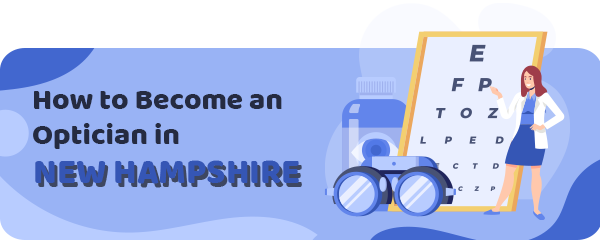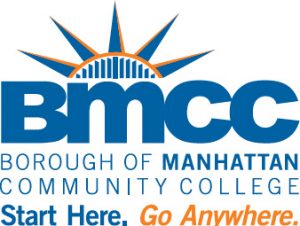If you are looking to change your career, you can easily become an optician.
For those who live in New Hampshire, there is a set of rules and regulations they need to follow.
Check out this article to learn more!
Article Table of Contents
Optician Job Duties
The daily responsibilities of an optician involve:
- Preparing eyewear
- Fitting and adjusting eyewear
- Educating customers about eyewear issues and maintenance
- Keeping sales records
- Determining insurance co-pays
- Keeping the inventory
- Interacting with the labs that make lenses
While these tasks represent a portion of the daily workload, they do not encompass the entirety of an optician’s responsibilities.
It is essential to note that dispensing contact lenses requires specialized certification in this field.
Optician Training in New Hampshire
Obtaining certification is not a mandatory requirement in the state of New Hampshire.
However, acquiring certification is recommended due to the broader range of career opportunities it opens up.
Many employers in this field also mandate certification as a prerequisite for employment.
In New Hampshire, the certification process is overseen by the American Board of Opticianry.
Prospective apprentices are required to meet certain entry criteria, including:
- Possession of a high school diploma or its equivalent.
- Successful completion of a comprehensive background check.
- Submission of sponsor details.
- Completion of a detailed application.
- Disclosure of health history.
- Provision of references.
- Documentation of relevant work history.
These hands-on training programs span approximately 2 years.
Despite the valuable experience gained through apprenticeships, aspiring opticians are strongly encouraged to pursue a formal degree in the field.
For those contemplating educational pursuits, exploring the offerings of the following institutions is a worthwhile consideration.
Otero College 
Prospective students don’t have to worry about the location of this college because they have access to its optician training program only through electronic means.
The college doesn’t have prerequisites for enrollment which can be done at any time through the year.
Otero College recommends students own at least a high school diploma or GED because these are needed for the ABO test.
Those who graduate from this program will obtain a certificate.
The college also offers the Bridge to Bachelor’s degree to those who wish a degree instead.
Students benefit from this option either during enrollment or during the first semester of study.
Ensuring the college offers an optometry program, is highly recommended.
Borough of Manhattan Community College 
This community college provides fully online classes with flexible enrollment, allowing candidates to join at any time.
While there are no specific enrollment requirements, having at least a high school diploma or GED is advisable.
The course covers various topics, including:
- The parts of the eye
- Refractive errors
- Strabismus and amblyopia
- Other common ocular conditions
- Prism basics
- Simple math and algebra
- Soft contact lenses
- Gas-permeable contact lenses
- Legal responsibilities and ethics
| School Name | Address |
|---|---|
| Borough of Manhattan Community College | online |
| Otero College | online |
Certification or Licensure for an Optician in New Hampshire
In the state of New Hampshire, there’s no obligatory state-level certification requirement.
Many individuals opt to undergo examinations conducted by the American Board of Opticianry (ABO) and the National Contact Lens Examiners (NCLE) without pursuing state-level certification.
To obtain a license from the NHBO (New Hampshire Board of Optometrists), the following steps are necessary:
- Completion of a minimum 2-year optometry course.
- Successful passage of the National Board of Examiners in Optometry (NBEO) exam.
- Successful completion of an exam covering RSA Chapter 327 and Board-established rules.
- Passing an exam organized by the Northeast Regional Clinical Optometric Assessment Testing Service (NERCOATS).
- Submission of two letters of recommendation.
- Holding CPR certification at level C.
The passing score for the RSA exam stands at 75%, and the Board-issued license requires renewal every couple of years.
Candidates undertaking ABO and NCLE exams are required to pay approximately $200 for each test.
Each test is available at three levels of difficulty:
- Beginner
- Intermediate
- Advanced.
For the ABO exam, candidates must study topics such as:
- Reading prescriptions,
- Fitting and dispensing spectacles
- Using standard ophthalmic equipment
The NCLE exam covers areas like:
- Pre-fitting for lenses,
- Diagnostic fitting,
- Dispensing of lenses,
- Patient education,
- Delivery
- Follow-up
Candidates need a passing score of at least 70% for both exams if they want to become licensed.
Optician Certification Renewal
Optician licenses in New Hampshire are valid for one year and need renewal.
Ensuring the continued validity of your license involves completing additional hours of education as part of the renewal process.
Optician Salary in New Hampshire
In the state of New Hampshire, opticians earn an annual income of $53,800.
The median salary for opticians across the country amounts to about $53,100 annually.
Refer to the detailed information presented in the table below for additional insights.
Annual Salary Range:| Location | Avg. Annual Salary |
|---|---|
| Merrimack | $57,500 |
| Amherst | $57,500 |
| Milford | $57,500 |
| New Ipswich | $57,300 |
| Salem | $56,700 |
| Plaistow | $56,700 |
| Derry | $55,900 |
| Sandown | $55,500 |
| Washington | $54,600 |
| Bedford | $54,400 |
Regional Salary in New Hampshire
| Region | Employed | Avg. Annual Salary | Avg. Hourly Pay | Top 10% Annual Salary | Bottom 10% Annual Salary |
|---|---|---|---|---|---|
| Manchester-Nashua, NH | 190 | $52,320 | $25.16 | $63,230 | $39,100 |
* Employment conditions in your area may vary.
Frequently Asked Questions
How can I stay updated on changes to the regulations regarding opticians in New Hampshire?
Many organizations change their rules and regulations.
Here are some institutions that can help you stay up-to-date with changes in the industry:
- American Board of Opticianry (ABO) and National Contact Lens Examiners (NCLE)
- Association of Regulatory Boards of Optometry
- Association of Schools and Colleges of Optometry
- Board of Registration in Optometry
- Commission on Opticianry Accreditation
- New Hampshire Board of Optometry
- New Hampshire Opticians Society
- New Hampshire Optometric Association
What are the skills needed by an optician in New Hampshire?
Opticians have the following abilities:
- Attention to details
- Good communication skills
- Adaptable to new situations
- Business skills
- Physical stamina
- Ability to perform repetitive tasks
Where can I find work as an optician in New Hampshire?
Opticians commonly find employment in various facilities, including:
- Retail Stores
- Offices
- Optometry Practices
- Hospitals
- Clinics
Read the full guide: How to Become an Optician

